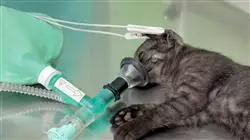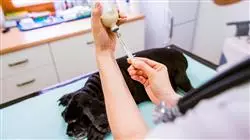University certificate
The world's largest faculty of veterinary medicine”
Introduction to the Program
Acquire the necessary skills to act as an expert in Hematological, Oncological, Metabolic and Toxicological Emergencies in Small Animals, with the mastery of the latest techniques and advances in this intervention"

In emergency medicine there is a series of understandings, procedures and techniques which are common in the majority of cases, independent of the specialty or specialties involved in each case.
Many clinicians are not comfortable with patients with a hematologic or oncologic emergency because they are unfamiliar with these pathologies or with the treatments many of these patients are receiving.
In these patients, laboratory tests, such as hemogram and cytology, play a fundamental role in the diagnosis and monitoring of the patient. The interpretation of a cytology requires not only theoretical knowledge but also a lot of experience.
Another frequent situation in the emergency department in small animal medicine is decompensated diabetic patients and addisonian crisis, the latter being underdiagnosed. In both cases, laboratory tests are fundamental in the diagnosis and control of the patient's evolution.
With regard to toxicological emergencies, a review is made of the most common emergencies in emergency departments, including pesticides, drugs for human and/or veterinary use, plants, insects and ophidian bites, among others.
In the patient with a toxicological emergency, a correct anamnesis is essential, as well as a diligent initial care based on the data obtained and the general examination, which may lead to the performance of gastric lavage or bathing or washing of the patient's body surface. All this, in order to reduce the absorption of the toxins involved while the clinician can stabilize the patient and perform the appropriate tests to determine the origin of the poisoning, the severity of the picture and the most appropriate treatment.
Thus, the care of a patient with these types of problems will be addressed, from the arrival at the emergency department, their initial stabilization, as well as the anamnesis, examination, complementary tests and medical treatment.
In short, we offer you a complete tour of all the areas of knowledge you need to provide quality emergency care.
The most complete training in the care of hematological, oncological, metabolic and toxicological emergencies in the online educational market"
This Postgraduate diploma in Hematologic, Oncologic and Metabolic Emergencies in Small Animals offers you the characteristics of a course of high scientific, teaching and technological level. These are some of its most notable features:
- Latest technology in online teaching software
- Highly visual teaching system, supported by graphic and schematic contents that are easy to assimilate and understand
- Practical cases presented by practising experts
- State-of-the-art interactive video systems
- Teaching supported by telepractice
- Continuous updating and recycling systems
- Self-regulating learning: full compatibility with other occupations
- Practical exercises for self-evaluation and learning verification
- Support groups and educational synergies: questions to the expert, debate and knowledge forums
- Communication with the teacher and individual reflection work
- Content that is accessible from any fixed or portable device with an Internet connection
- Supplementary documentation databases are permanently available, even after the course
A Postgraduate Diploma who will train you to deal with the most complicated groups of emergencies in terms of diagnosis and treatment for the professional"
The topics and clinical cases proposed, as well as their resolution, are based on the practical experience of the teachers and on the cases most frequently seen in emergency veterinary services.
All information is presented through high-quality multimedia content, analysis of clinical cases prepared by teachers, master classes and video techniques that allow the exchange of knowledge and experience, maintain and update the skill level of its members, create protocols for action and disseminate the most important developments in the emergencies within medicine of small animals.
Our teaching staff is made up of professionals from different fields related to this specialty. In this way, we ensure that we provide you with the training update we are aiming for. A multidisciplinary team of professionals trained and experienced in different environments, who will cover the theoretical knowledge in an efficient way, but, above all, will put the practical knowledge derived from their own experience at the service of the course: one of the differential qualities of this course.
This mastery of the subject is complemented by the effectiveness of the methodological design of this Expert. Developed by a multidisciplinary team of e-learning experts, it integrates the latest advances in educational technology. This way, you will be able to study with a range of comfortable and versatile multimedia tools that will give you the operability you need in your training.
With a methodological design based on proven teaching techniques, this training will allow you to learn in a dynamic and effective way"

Our innovative telepractice concept will give you the opportunity to learn through an immersive experience, which will provide you with a faster integration and a much more realistic view of the contents: “learning from an expert”
Why study at TECH?
TECH is the world’s largest online university. With an impressive catalog of more than 14,000 university programs available in 11 languages, it is positioned as a leader in employability, with a 99% job placement rate. In addition, it relies on an enormous faculty of more than 6,000 professors of the highest international renown.

Study at the world's largest online university and guarantee your professional success. The future starts at TECH”
The world’s best online university according to FORBES
The prestigious Forbes magazine, specialized in business and finance, has highlighted TECH as “the world's best online university” This is what they have recently stated in an article in their digital edition in which they echo the success story of this institution, “thanks to the academic offer it provides, the selection of its teaching staff, and an innovative learning method aimed at educating the professionals of the future”
A revolutionary study method, a cutting-edge faculty and a practical focus: the key to TECH's success.
The most complete study plans on the university scene
TECH offers the most complete study plans on the university scene, with syllabuses that cover fundamental concepts and, at the same time, the main scientific advances in their specific scientific areas. In addition, these programs are continuously being updated to guarantee students the academic vanguard and the most in-demand professional skills. In this way, the university's qualifications provide its graduates with a significant advantage to propel their careers to success.
TECH offers the most comprehensive and intensive study plans on the current university scene.
A world-class teaching staff
TECH's teaching staff is made up of more than 6,000 professors with the highest international recognition. Professors, researchers and top executives of multinational companies, including Isaiah Covington, performance coach of the Boston Celtics; Magda Romanska, principal investigator at Harvard MetaLAB; Ignacio Wistumba, chairman of the department of translational molecular pathology at MD Anderson Cancer Center; and D.W. Pine, creative director of TIME magazine, among others.
Internationally renowned experts, specialized in different branches of Health, Technology, Communication and Business, form part of the TECH faculty.
A unique learning method
TECH is the first university to use Relearning in all its programs. It is the best online learning methodology, accredited with international teaching quality certifications, provided by prestigious educational agencies. In addition, this disruptive educational model is complemented with the “Case Method”, thereby setting up a unique online teaching strategy. Innovative teaching resources are also implemented, including detailed videos, infographics and interactive summaries.
TECH combines Relearning and the Case Method in all its university programs to guarantee excellent theoretical and practical learning, studying whenever and wherever you want.
The world's largest online university
TECH is the world’s largest online university. We are the largest educational institution, with the best and widest online educational catalog, one hundred percent online and covering the vast majority of areas of knowledge. We offer a large selection of our own degrees and accredited online undergraduate and postgraduate degrees. In total, more than 14,000 university degrees, in eleven different languages, make us the largest educational largest in the world.
TECH has the world's most extensive catalog of academic and official programs, available in more than 11 languages.
Google Premier Partner
The American technology giant has awarded TECH the Google Google Premier Partner badge. This award, which is only available to 3% of the world's companies, highlights the efficient, flexible and tailored experience that this university provides to students. The recognition as a Google Premier Partner not only accredits the maximum rigor, performance and investment in TECH's digital infrastructures, but also places this university as one of the world's leading technology companies.
Google has positioned TECH in the top 3% of the world's most important technology companies by awarding it its Google Premier Partner badge.
The official online university of the NBA
TECH is the official online university of the NBA. Thanks to our agreement with the biggest league in basketball, we offer our students exclusive university programs, as well as a wide variety of educational resources focused on the business of the league and other areas of the sports industry. Each program is made up of a uniquely designed syllabus and features exceptional guest hosts: professionals with a distinguished sports background who will offer their expertise on the most relevant topics.
TECH has been selected by the NBA, the world's top basketball league, as its official online university.
The top-rated university by its students
Students have positioned TECH as the world's top-rated university on the main review websites, with a highest rating of 4.9 out of 5, obtained from more than 1,000 reviews. These results consolidate TECH as the benchmark university institution at an international level, reflecting the excellence and positive impact of its educational model.” reflecting the excellence and positive impact of its educational model.”
TECH is the world’s top-rated university by its students.
Leaders in employability
TECH has managed to become the leading university in employability. 99% of its students obtain jobs in the academic field they have studied, within one year of completing any of the university's programs. A similar number achieve immediate career enhancement. All this thanks to a study methodology that bases its effectiveness on the acquisition of practical skills, which are absolutely necessary for professional development.
99% of TECH graduates find a job within a year of completing their studies.
Postgraduate Diploma in Hematologic, Oncologic and Metabolic Emergencies in Small Animals
The care of small animal emergencies is a complex and challenging task, especially when dealing with cases of hematologic, oncologic, metabolic and toxicologic emergencies. To adequately address these cases, it is essential to have specialized knowledge in these areas, including the accurate interpretation of the laboratory tests that are often required. To this end, TECH has created the Postgraduate Diploma in Hematologic, Oncologic and Metabolic Emergencies in Small Animals, a 100% online program that seeks to provide you with the necessary tools to address these cases effectively and efficiently.
Master the most advanced techniques for Emergency Care in Small Animals
Through this Postgraduate Diploma in Hematologic, Oncologic and Metabolic Emergencies in Small Animals, you will delve into specific aspects related to these areas of specialization, including patient care from arrival at the emergency department, initial stabilization, anamnesis, examination and complementary tests. Also, from the hand of an exceptional teaching staff, you will learn how to correctly interpret laboratory tests, including hemogram and cytology, as well as how to apply the most appropriate treatments for each case.







